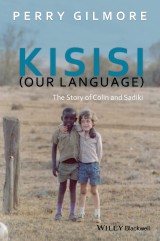Details

Kisisi (Our Language)
The Story of Colin and SadikiNew Directions in Ethnography 1. Aufl.
|
20,99 € |
|
| Verlag: | Wiley-Blackwell |
| Format: | |
| Veröffentl.: | 13.08.2015 |
| ISBN/EAN: | 9781119101581 |
| Sprache: | englisch |
| Anzahl Seiten: | 192 |
DRM-geschütztes eBook, Sie benötigen z.B. Adobe Digital Editions und eine Adobe ID zum Lesen.
Beschreibungen
<b>Recognized as a finalist for the CAE 2018 Outstanding Book Award!</b><br /><br />Part historic ethnography, part linguistic case study and part a mother’s memoir, <i>Kisisi</i> tells the story of two boys (Colin and Sadiki) who, together invented their own language, and of the friendship they shared in postcolonial Kenya. <br /> <ul> <li>Documents and examines the invention of a ‘new’ language between two boys in postcolonial Kenya</li> </ul> <ul> <li>Offers a unique insight into child language development and use</li> </ul> <ul> <li>Presents a mixed genre narrative and multidisciplinary discussion that describes the children’s border-crossing friendship and their unique and innovative private language</li> </ul> <ul> <li>Beautifully written by one of the foremost scholars in child development, language acquisition and education, the book provides a seamless blending of the personal and the ethnographic</li> </ul> <ul> <li>The story of Colin and Sadiki raises profound questions and has direct implications for many fields of study including child language acquisition and socialization, education, anthropology, and the anthropology of childhood</li> </ul>
<p>Acknowledgments ix</p> <p>Map xiii</p> <p>Prologue xv</p> <p>1 Uweryumachini!: A Language Discovered 1</p> <p>2 Herodotus Revisited: Language Origins, Forbidden Experiments, New Languages, and Pidgins 17</p> <p>3 Lorca's Miracle: Play, Performance, Verbal Art, and Creativity 35</p> <p>4 Kekopey Life: Transcending Linguistic Hegemonic Borders and Racialized Postcolonial Spaces 58</p> <p>5 Kisisi: Language Form, Development, and Change 93</p> <p>Epilogue 132</p> <p>In Memoriam 137</p> <p>Notes 138</p> <p>References 146</p> <p>Index 157</p>
<b>Perry Gilmore</b>, a sociolinguist and educational anthropologist, is Professor of Language, Reading and Culture at the University of Arizona, USA. She is also Professor Emerita, and Affiliate Faculty at the Alaska Native Language Center, at the University of Alaska Fairbanks. Gilmore is the author of numerous ethnographic studies and co-editor of major ethnography collections including, <i>Children In and Out of School: Ethnography and Education</i> (1982) and <i>The Acquisition of Literacy: Ethnographic Perspectives </i>(1986). Gilmore is the past President of the Council on Anthropology and Education, a major section of the American Anthropology Association.
<p>In 1975, on a remote hillside in postcolonial Up-Country Kenya, two five-year-old boys, one American and one Samburu, met and became inseparable friends for a period of 15 months. Colin and Sadiki’s controversial postcolonial friendship was created through and marked by their invention of <i>Kisisi</i>, an original Swahili pidgin that was understood and shared by just the two of them.</p> <p>Moving gracefully between intimacy and colonial relations, this study documents a rare case of child language invention that demonstrates striking linguistic and sociolinguistic competencies of young children. As the boys negotiate diverse linguistic ecologies and cultural spaces, they display their abilities as highly effective language innovators. Though the study took place 40 years ago, these examples have significant implications for the study of global cultural encounters prevalent in our increasingly diverse world.</p> Part historic ethnography, part linguistic case study, and part a mother’s memoir, <i>Kisisi</i> is a human story of irrepressible expressive creativity as the boys’ quest for language equality creates a place for their friendship that transcends the existing language ideologies, marked colonial borders, and harsh inequities of economics, race and culture that engulfed all aspects of their daily lives.
<p><i>“Kisisi </i>braids brilliant linguistic analysis with compelling critical ethnography. A gifted storyteller, Gilmore offers stunning scholarship contesting child language theories and reflecting on the dynamics of stark structural Kenya colonialism.”<br />Michelle Fine, Distinguished Professor of Critical Psychology, The Graduate Center, CUNY</p> <p> “A story, lovingly told, of two boys’ exceptional friendship in a colonial setting. A remarkable example of linguistic practice as emergent in, and inseparable from, the relationships and activities it serves.”\<br />Penelope Eckert, Professor of Linguistics, Stanford University</p> <p> “A thoroughly unique and artfully crafted documentation of children’s creativity at work in inventing a new pidgin language and agency in resisting prevailing language ideologies.”<br />Marjorie Harness Goodwin, Professor of Anthropology, UCLA</p> <p> <i>“Kisisi (Our Language)</i> is a unique and invaluable account of how two five-year-old boys--one Kenyan, one American--created a spontaneous pidgin. Incisive and poetic, it’s part linguistic analysis, part gripping story of culture contact, part deeply moving memorial to a life tragically cut short. This book will fascinate and move anyone interested in language, children, or human experience.”<br />Deborah Tannen, University Professor, Georgetown University</p>

















